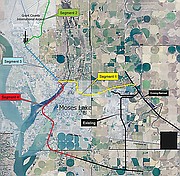Unity needed for next rail proposal
MOSES LAKE - Community members must show unity in presenting a second proposal to the state Legislature about freight rail expansion routes near Moses Lake, said Kent Jones, the port's commission president.
A group of about 40 business people and community members gathered at Big Bend Community College's ATEC Center to rethink their next step.
"It's extremely important we're telling the same story," Jones said.
No decisions were made, but a smaller group of six people will meet in the future to discuss freight rail options.
A March meeting at the Port of Moses Lake resulted in port commissioners asking state legislators to reallocate $2 million in funding to another area of the wide-scale rail expansion.
The initial plan was to start the expansion near the airport.
Instead the port commission, with input from community members and the Columbia Basin Railroad, asked state lawmakers to allow the port to use the funds for another part of the project, possibly in the Wheeler Corridor industrial area.
The funding was not reallocated this year as requested and the port will have to reapply for funding.
Jones said in the past, they got very narrowly focused on the cheapest way to bring rail to the port.
From his perspective, the port has the support of legislators, but needs to come up with a plan of action that makes sense, Jones said.
"As long as we're making progress, the port is willing to take the lead in making it happen," he said.
David Smelser, of the state Department of Transportation (DOT), said he couldn't speak for legislators, but the port's needs were still on the DOT's radar.
Smelser said the group has to be in agreement about a route to successfully obtain funding.
Kyle Lynch, legislative assistant to Rep. Judy Warnick, R-Moses Lake, was asked by his boss to mention the safety issue at Longview Elementary School in Moses Lake.
There is no official crossing across the rail tracks. The railroad track is a long dividing line between the school playground and many homes.
Some children cross the tracks instead of walking around, according to a 2008 Columbia Basin Herald article.
Columbia Basin Railroad Chief Operating Officer Tim Kelly spoke of a 2006 rail study that mentioned a focus on aerospace industry development.
With Boeing's consideration of Moses Lake for a manufacturing site, more rail could be required criteria, he explained.
Jones said if Moses Lake is going to be a player with Boeing, it would have to have more rail.
Rail is important with attracting businesses and jobs, he said.
John Wright, of Zipp Trucking, said the biggest concern from the last rail meeting was to remove rail from downtown Moses Lake.
Longterm, he wants to work with the railroad as a trucking company.
To develop the port, serviceable rail is needed for BMW/SGL Automotive Carbon Fibers, Takata and other companies.
Wright's concern about extending service to the Wheeler area via Wheeler Road was creating safety and traffic problems. His preference is to use the old Milwaukee Rail site, which would move rail away from Longview Elementary.
Most of Moses Lake's growth is north of the port and at the Wheeler area, he said.
Developer Del Crittenden said if the rail came through his project off Wheeler Road, he wouldn't like that.
Moses Lake city councilman Dick Deane said the majority of residents would be supportive of removing rail from downtown.
One man, who didn't identify himself, said he agreed with Wright. There are flaws in the proposed Wheeler Road expansion route, as one has to cross Wheeler Road twice, which would stop traffic at National Frozen Foods.
The man thought the study should be updated.
Jerome Brotherton, of Brotherton Seed, asked if the railroad would drop the spur for current users in exchange for a new route.
Jones, of the Port of Moses Lake, said the port has never looked at buying existing rail.
Kelly, of Columbia Basin Railroad, said the railroad couldn't afford to maintain the route with the existing level of traffic and it will cease to exist.
If they are going to start over on a different route, there will be consequences, Kelly said.
Ron Covey, president of the Grant County Economic Development Council, said he thinks rail is a community issue.
He advised the group not to plan a route that would cause congestion like Yakima is experiencing.
Covey is also board president of the Moses Lake Irrigation and Rehabilitation District, which is responsible for lake management and cleanup.
He said it would be catastrophic if a rail car full of toxic chemicals accidentally fell in the lake.
Tim Marshall, of Columbia Basin Railroad, said he heard many of the same issues 10 years ago and it seems like they are going backwards.
They are valid concerns, but have already been addressed, he pointed out.
Bob Fancher, of North Central Construction, said he thought rail needs to benefit all industrial areas.
Port commissioner Brian McGowan said the port is just one of many entities, but he is not seeing others come forward with financial support.
Moses Lake realtor Mark Fancher said he didn't think anyone was relying on the port.
Ralph Kincaid, broker/owner of Windemere Real Estate in Moses Lake, said a lot of effort went into the original study. He was afraid a new study's conclusions might be the same.
He suggested the group take a look at what has already been permitted.
Port commissioner Mike Conley said timing is important and the project has a lot of pluses.
The port must have a proposal to the state by the end of November 2012, after the elections, for consideration during the 2013 Legislative session.
"I think they see Moses Lake as a growing community helping the economic vitality of the state," Conley said.





